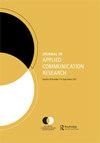沟通、残暴和新自由主义的耻辱:美国的饥饿和粮食援助案例
IF 1.7
2区 文学
Q2 COMMUNICATION
引用次数: 3
摘要
借鉴三种批判理论——福柯式的生命政治学、批判种族理论和社会学家卢瓦克·瓦奎特的工作——我认为新自由主义的污名是设计食物(援助)系统的基础。新自由主义的污名是在羞耻、怀疑和监视的话语实践中构成的,这是一种交流和拘留技术,用于约束贫穷和种族化的社区,以努力管理饥饿和贫困。这些交流技术根植于反穷人、种族主义和暴力的逻辑,并针对黑人和棕色人种的身体,对健康和社会福祉产生负面影响。我以亲身经历过饥饿的人们的声音为基础,展示了在围绕粮食援助的话语实践中,羞耻、怀疑和监视以平凡而特殊的方式出现,以及这些实践如何将粮食援助和残暴行为变成“单一的组织装置”。分析最后提出了在种族主义暴力中打破新自由主义污名所需要的三种广泛干预措施。本文章由计算机程序翻译,如有差异,请以英文原文为准。
Communication, carcerality, and neoliberal stigma: the case of hunger and food assistance in the United States
ABSTRACT Drawing on three strains of critical theory – Foucauldian biopolitics, critical race theory, and the work of sociologist Loic Wacquant – I argue that neoliberal stigma is foundational to the design of the food (assistance) system. Neoliberal stigma is constituted in the discursive practices of shame, suspicion, and surveillance, which are communicative and carceral technologies used to discipline poor and racialized communities in their efforts to manage hunger and poverty. These communicative technologies are rooted in anti-poor, racist, and carceral logics and are deployed against Black and Brown bodies negatively impacting health and social wellbeing. Drawing on the voices of people with lived experiences of hunger, I demonstrate the mundane and exceptional ways in which shame, suspicion, and surveillance emerge in discursive practices surrounding food assistance and how these practices enjoin food assistance and carcerality into a ‘single organizational contraption.’ The analysis ends with three broad interventions required to disrupt neoliberal stigma amid racist violence.
求助全文
通过发布文献求助,成功后即可免费获取论文全文。
去求助
来源期刊

Journal of Applied Communication Research
COMMUNICATION-
CiteScore
4.00
自引率
8.70%
发文量
52
期刊介绍:
The Journal of Applied Communication Research publishes original scholarship that addresses or challenges the relation between theory and practice in understanding communication in applied contexts. All theoretical and methodological approaches are welcome, as are all contextual areas. Original research studies should apply existing theory and research to practical solutions, problems, and practices should illuminate how embodied activities inform and reform existing theory or should contribute to theory development. Research articles should offer critical summaries of theory or research and demonstrate ways in which the critique can be used to explain, improve or understand communication practices or process in a specific context.
 求助内容:
求助内容: 应助结果提醒方式:
应助结果提醒方式:


